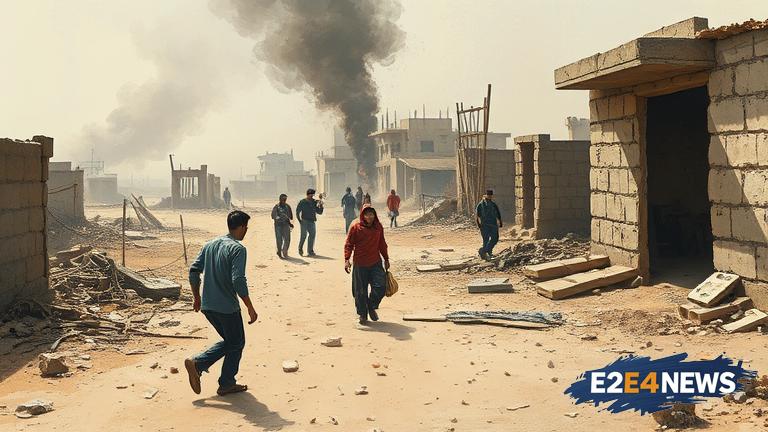The Gaza Strip, a coastal region in the Middle East, is facing a severe famine that has been described as a man-made tragedy. The crisis has been exacerbated by Israel’s blockade, which has restricted the movement of goods and people in and out of the region. The blockade, which has been in place since 2007, has had a devastating impact on the economy and infrastructure of Gaza, leading to widespread poverty and unemployment. The situation has been further complicated by the COVID-19 pandemic, which has disrupted global supply chains and led to a shortage of essential goods. The famine in Gaza has been characterized by a severe shortage of food, medicine, and other essential supplies, leaving thousands of people without access to basic necessities. The crisis has been particularly severe in the southern part of the Gaza Strip, where the population is densely concentrated and the economy is heavily reliant on agriculture. The Israeli blockade has made it difficult for farmers to export their produce, leading to a significant decline in agricultural production and a shortage of fresh produce in the market. The situation has been further exacerbated by the destruction of infrastructure, including roads, bridges, and buildings, which has made it difficult for aid to reach those in need. The international community has been criticized for its response to the crisis, with many arguing that it has been inadequate and ineffective. The United Nations has warned of a humanitarian catastrophe in Gaza, with the potential for widespread famine and disease. The crisis has also had a significant impact on the mental health of the population, with many people experiencing anxiety, depression, and post-traumatic stress disorder. The situation in Gaza has been described as a ticking time bomb, with the potential for widespread violence and instability. The Israeli government has been accused of using the blockade as a form of collective punishment, which is prohibited under international law. The Palestinian Authority has called for an end to the blockade and the establishment of a sovereign Palestinian state. The international community has a responsibility to act to prevent a humanitarian catastrophe in Gaza, including providing emergency aid and working towards a lasting resolution to the conflict. The crisis in Gaza is a complex and multifaceted issue, requiring a comprehensive and sustained response from the international community. The situation has been further complicated by the involvement of other regional actors, including Egypt and the United Arab Emirates. The crisis has also had a significant impact on the regional economy, with trade and commerce disrupted by the blockade. The international community must take immediate action to address the crisis in Gaza, including providing emergency aid and working towards a lasting resolution to the conflict. The situation in Gaza is a stark reminder of the need for a comprehensive and sustained approach to addressing humanitarian crises, including the provision of emergency aid and the establishment of a lasting peace. The crisis has also highlighted the need for greater accountability and transparency in the response to humanitarian crises, including the need for independent monitoring and evaluation of aid efforts. The international community must also address the root causes of the crisis, including the Israeli-Palestinian conflict and the blockade of Gaza. The situation in Gaza is a complex and multifaceted issue, requiring a comprehensive and sustained response from the international community. The crisis has also had a significant impact on the human rights of the population, including the right to food, water, and shelter. The international community must take immediate action to address the crisis in Gaza, including providing emergency aid and working towards a lasting resolution to the conflict.
